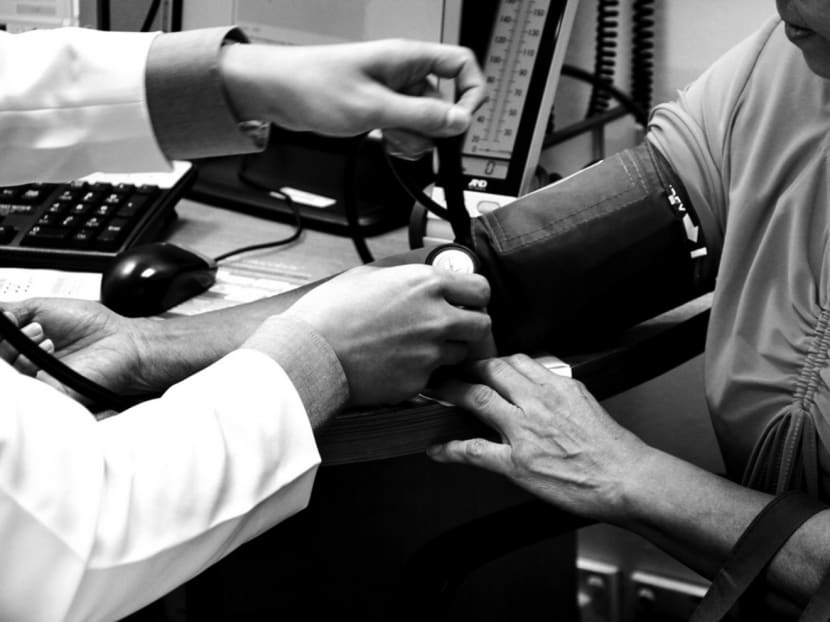Improve follow-up care for diabetics, doctors urge
SINGAPORE — Besides raising awareness among Singaporeans to eat healthily, exercise more, and undergo early screening as part of Singapore’s fight against diabetes, doctors have stressed the need for a more robust system of follow-up care for those afflicted with the disease.

Besides raising awareness among Singaporeans to eat healthily, exercise more, and undergo early screening as part of Singapore’s fight against diabetes, doctors have stressed the need for a more robust system of follow-up care for those afflicted with the disease. TODAY file photo
SINGAPORE — Besides raising awareness among Singaporeans to eat healthily, exercise more, and undergo early screening as part of Singapore’s fight against diabetes, doctors have stressed the need for a more robust system of follow-up care for those afflicted with the disease.
The topic was brought up by Prime Minister Lee Hsien Loong during the National Day Rally on Sunday, as he highlighted the seriousness of the problem here. Among other things, Mr Lee urged Singaporeans to take action to control and guard against the disease.
Nevertheless, the medical practitioners noted that more can also be done to improve follow-up care. Currently, most diabetics see a doctor every three or six months, primarily to get their medicine.
“The traditional healthcare system (centred around acute care) has built up a very good medication delivery system — this whole network where we are very good at prescribing medication to patients,” said Dr Yau Teng Yan, chief medical officer at Holmusk, a Singapore-based digital health and analytics start-up.
However, he felt that the country lacks a system which integrates allied health professionals such as dieticians and medical social workers who provide the psycho-social support for patients with chronic diseases such as diabetes.
Dr Goh Kian Peng, a senior consultant at the Saint-Julien Clinic for Diabetes and Endocrinology in Mount Alvernia Hospital, felt that doctors should “go back to the basics” and spend more time getting to know patients and their lifestyle, before deciding on the most appropriate treatment for them.
Diabetes is best treated through building a rapport with patients, which “cannot be done overnight” or within a consultation lasting between 10 and 15 minutes.
Agreeing, Dr Chan Tat Hon, a general practitioner from United Specialist Centre, said the war against diabetes has to be fought from within the doctors’ consultation rooms.
“What happens in the consultation room is very important … patients tend to sit up and listen,” said Dr Chan, who conducts lifestyle modification programmes and training for patients with chronic conditions such as diabetes.
While public hospitals are often overloaded with diabetic patients, Dr Goh suggested expanding financial support for such patients when they seek treatment from private hospitals, in order to “spread the load more evenly” among all the hospitals.
“Hopefully over time, each diabetic patient can get the time he deserves with the doctor, whether in the public or private sector,” he said.
During the parliamentary debate on the Ministry of Health’s (MOH)budget in March, the ministry said there will be enhanced subsidies from next month for the Screen for Life programme — which allows eligible Singaporeans to undergo recommended screening tests for conditions including diabetes.
This is to encourage more Singaporeans to go for screening and a follow-up visit at clinics participating in the Community Health Assist Scheme. By bundling the screening and the first consultation, the MOH wants to cut the number of people who fail to follow up with a doctor after screening.
To make healthcare more convenient and accessible, the MOH has also laid out a “One Singaporean, One Family Doctor” vision, where each person will have long-term partnerships with a regular family doctor who is familiar with his or her needs.
Dr Goh stressed the need for an integrated approach involving other government agencies and stakeholders.
Citing how shift workers such as taxi drivers often find it hard to eat regular meals, Dr Goh said the Ministry of Manpower and employers should get involved, for example, to help employees “eat well and live well”.
Security guard Devadas Nagalindan, 56, who has diabetes, said he would like an employer who understands that he is unable to work overtime and needs to have his meals regularly, among other things.
Mr Ravikrishnan S, 57, a property manager who was diagnosed with diabetes four years ago, would like to have someone help him change his lifestyle through his diet.
He finds it hard to resist his favourite Indian sweet, gulab jamun, which comes doused in syrup.
“I always think I can overcome it so I won’t go out of the way to (change my lifestyle),” he said.








